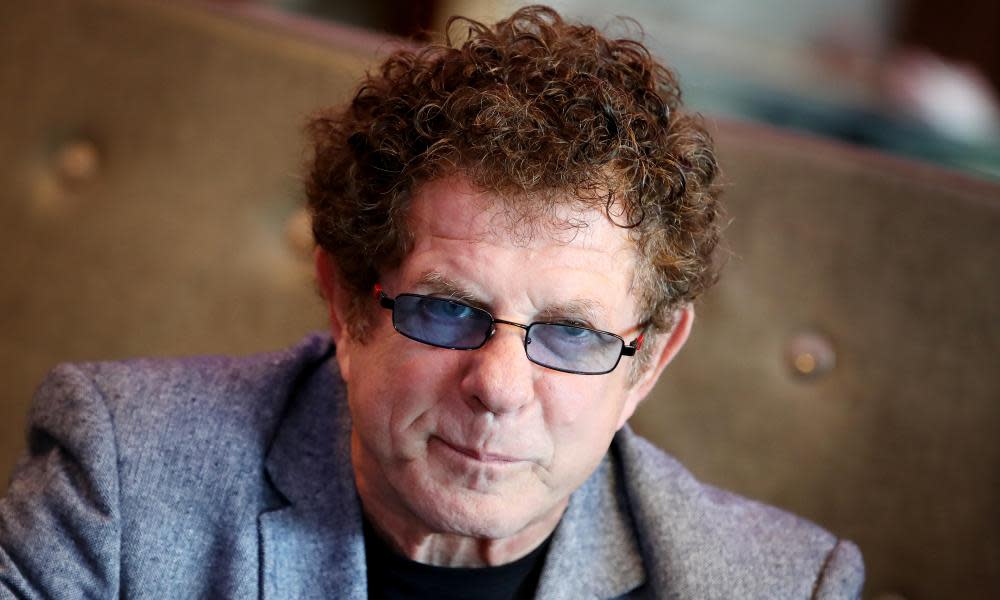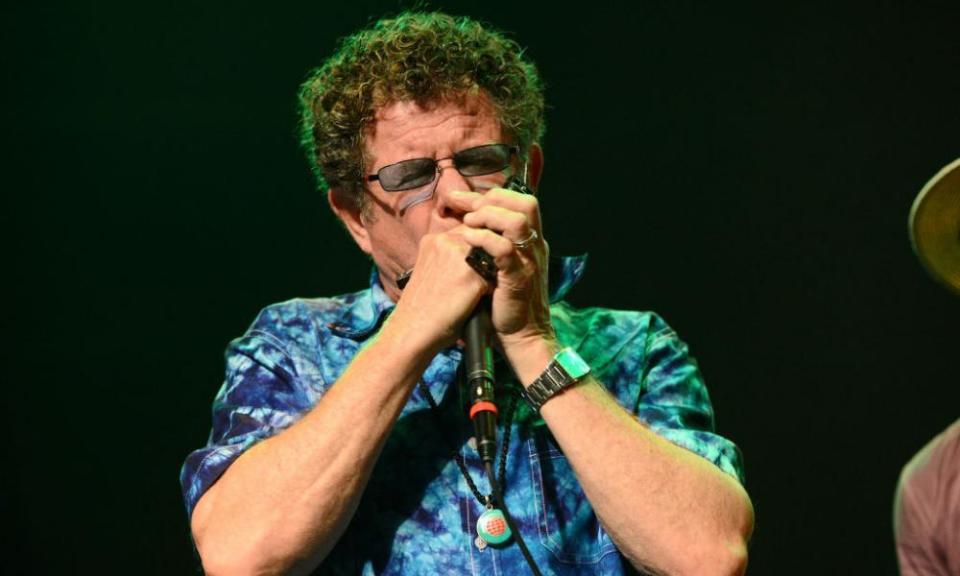‘You can never totally overcome it’: harmonica legend Lee Oskar on his family’s Holocaust trauma

- Oops!Something went wrong.Please try again later.
When harmonica legend Lee Oskar was seven years old and about to enter a new school, his mother gave him a stern warning. “‘If anybody asks what school you’re in, say it’s a religious school,’” Oskar recalled. “Never say ‘Jewish school’. There was always this intense fear about telling anyone I was Jewish.”
Her warning came in 1955, a full decade after the defeat of the Nazis, when Oskar’s family was living in Copenhagen, one of the most accepting cities in Europe. But, as the musician says, “that didn’t matter. The fear never goes away.”
Related: ‘I got 12 years and 74 lashes’: Confess, the band jailed for playing metal in Iran
That’s especially true for families like Oskar’s. His mother and aunt are Holocaust survivors who experienced a litany of terrors as unimaginable as they are undeniable. And, as Oskar says, “those experiences don’t end with the people who survived them. It continues in their children and in future generations.”
For Oskar, that meant a constant thrum of dread “that, at any moment, someone could come to my door and shoot me”. The feeling of ambient distress persisted even as Oskar grew to become a key member of one of the most successful and influential bands of the 70s, War. Their hits, from Low Rider to Cisco Kid to The World is a Ghetto, proved so rhythmically inventive and culturally resonant they remain touchstones of pop as well as lodestones of hip-hop sampling. While elements of Oskar’s family history subtly informed his work throughout his career, only now, at 73, has he created an album wholly focused on both the private processing, and the public preservation, of that legacy. An all-instrumental collection titled Never Forget, the album serves as what the musician calls “my musical memoir”. It features a wide palate of sound, from sweeping classical orchestrations and haunting klezmer interludes to intimate sections centered on an oud, a flamenco guitar and Oskar’s own supple harmonica.
It’s his first solo work in 25 years, and the one he felt most compelled to create. “If I went to my grave and never expressed the fears and humiliations that have always been in me I would be ashamed of myself,” Oskar says during a Zoom interview from his home near Seattle. “I have a fiduciary responsibility to my art, to humanity and to my family to acknowledge that this happened.”
To flesh the story out, pictures of his mother and aunt appear throughout the set’s elaborate packaging. But the full horror, as well as the surprising inspiration, embedded in their story can only be found in a riveting 1999 documentary about his aunt, Judy Meisel, titled Tak for Alt (Danish for “thanks for everything”). The mere outlines of the sisters’ horrific saga include being confined and starved as teenagers in the Kovno ghetto in their native Lithuania, before being sent to the Stutthof concentration camp in Poland where, upon arrival, a female SS officer tore every tuft of hair out of Meisel’s head by hand. At the camp, their mother was murdered in the gas chamber, a fate the sisters escaped by a fluke. From there, the young women endured a death march out of the camp while bombs exploded all around them, as well as a vexing time hiding under assumed names in a nunnery, before making their way to a boat bound for Denmark, which was torpedoed along the way.
Oskar’s aunt Judy dedicated her life to speaking out about the sisters’ experiences, in schools, public lectures and for historical projects. She also made sure to connect their story to the American civil rights movement. But Oskar’s mother, Rachel, could never talk about it. “She was too devastated,” he says. “Because she was older than my aunt and so acted like a mother to her, it affected her differently.”
At the same time, his mother had a non-verbal way of preserving her story. “She would write over and over again on little scraps of paper the timeline of her life, in Yiddish and Danish and English,” Oskar says. “She wanted people to know ‘I was in this killing camp.’”
The experience kept her on perpetual edge. “Even when we watched a cowboy movie as kids, the sight of a gun would trigger her.”
The intensity in the family affected Oskar deeply growing up. “There was no joy at home. I don’t think anything in their lives could be embraced the way they should have been.”
Oskar began to find his own joy through music, though his parents never encouraged it. “I remember coming home at eight years old with a guitar and bongos we made at school. I was so excited. But it wasn’t like, ‘Oh, sweetheart, that’s nice.’ It was more like ‘What is this? You’re wasting your time.’”

Harmonica entered his life as a child. “Every kid got one. The next year, it was the hula-hoop and then it was the yo-yo. But I kept playing harmonica.”
The heaviness Oskar felt at home, as well as his ambitions to design a radically different life for himself, prompted him to leave not only his family but his country at 18. First, he came to New York and busked on the streets, before migrating to Los Angeles, where he met the other musicians who would comprise War. He also met Eric Burdon, who was seeking fresh artistic inspiration after the breakup of the Animals in 1969. By that time, Oskar had already changed his birth name, Oskar Levitin, to Lee Oskar, a decision partially driven by the desire to mask his Jewish identity. War released two albums with Burdon, marked by the Latin-tinged pop hit Spill the Wine as well as a growing reputation as an exceptional live act. In September 1970, a headline in NME labelled them “the best live band we’ve ever seen”. The performance that inspired that accolade later became historic for a jam between War and Jimi Hendrix that turned out to be the final performance by the guitarist, who died the next day. “Jimi wasn’t in good shape,” Oskar recalls. “He said to me, ‘Lee, am I playing OK?’” Yet he still managed to deliver some exemplary solos.
After Burdon left the band, it looked to some observers like War itself might die. But Oskar says he never doubted a bright future for them given the chemistry between the players, the rarity of their image, and the singular breadth of their sound. Comprising Black, Latin and white members, War drew on R&B, soul, Latin music, rock, pop and jazz. While they racked up a long list of smash singles, their full albums offered a far more expansive sound, rife with elaborate solos and complex rhythms. “If you just heard the singles, you really missed the boat,” says Oskar.
A unique factor in War’s sound was the decision to place Oskar’s harmonica in the context of a horn section along with saxophonist Charles Miller. The two players created the 12-note call-and-response in Low Rider that remains one of music’s most recognizable, and coolest, hooks. “We loved to create those counter-melodies,” Oskar says.
War’s approach to vocals also stood out, both as a sound and as a symbol. Various members often sang in unison, giving the music the feel of a community in conversation, clamorous but convivial. The effect communicated a message of unity that made War’s sound and sensibility the opposite of its namesake.
While still with the band, Oskar began releasing solo albums in 1975 with a self-titled work. By the next year, he was voted the top instrumental artist by Billboard. In 1980, the title track of his album My Road, Our Road, explored some of the themes that would finally come to fruition more than 40 years later on Never Forget. A very different version of the old track My Road serves as the new album’s finale, which is Oskar’s way of extending his relatives’ path through his own. Another song on the new album, Miracle Children, borrows a phrase his aunt Judy often used to describe Oskar, as well as his siblings and cousins, for being the offspring his mother and aunt never expected to have. Though the album uses no words to convey its message, Oskar feels “the music isn’t missing anything. I’m singing with my harmonica.”
For Oskar, the creation of the album has had a liberating effect, exorcizing what had haunted and inspired him for so long. Sadly, both his mother and his aunt died before they could hear the final music; Judy Meisel died just this last year at 91. Throughout their lives after the war, the sisters remained alert to the successive waves of Holocaust deniers, and alarmed by the lure of authoritarian regimes, some of which are, again, on the rise in the very areas they escaped 70 years ago. “The horrific things that humanity has done to each other keep repeating,” Oskar says. “No matter how many generations come along, you can never totally overcome it.”
Never Forget is released on 28 January

